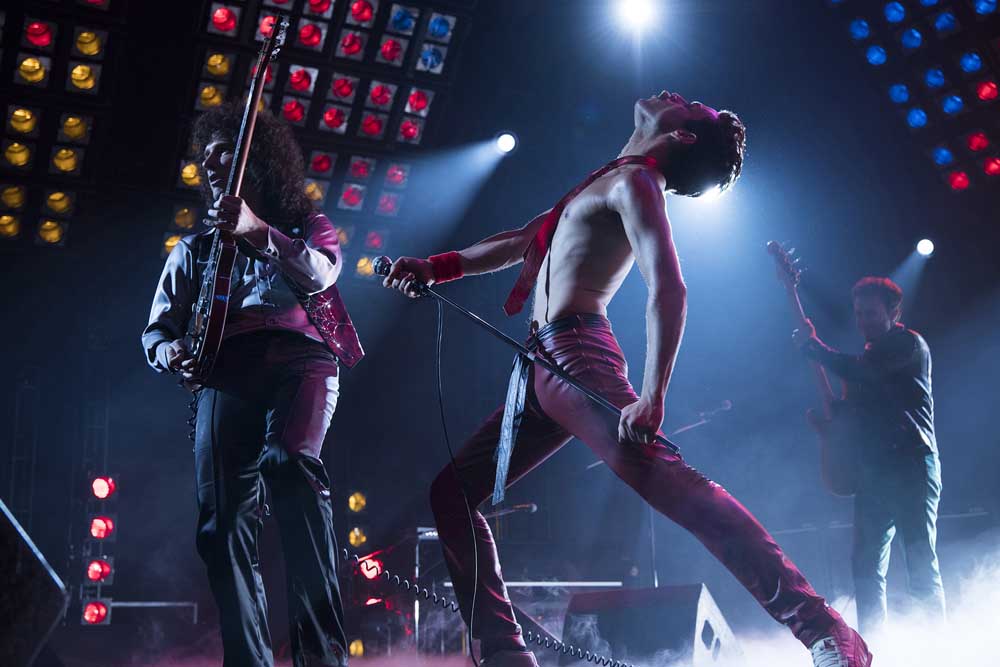‘Bohemian Rhapsody’
Published 12:00 am Thursday, November 1, 2018

- Gwilym Lee (Brian May) from left, Rami Malek (Freddie Mercury) and Joe Mazzello (John Deacon) in "Bohemian Rhapsody." (Alex Bailey /Twentieth Century Fox)
At the center of the long-gestating Queen biopic “Bohemian Rhapsody” is the kind of performance that’s less acting than it is the channeling of a spirit from another realm. Rami Malek takes to the role of Queen frontman Freddie Mercury with a studious intensity, making manifest the dueling relationship between the twin poles of Mercury’s personality: his confidence and his insecurity. It’s the centrifuge around which the rather uneven film whirls, and Malek keeps it going with his sheer will and talent, aided by a parade of legendary Queen hit singles.
Director Bryan Singer’s name appears on a single title card during the opening credits, thanks to the Director’s Guild, even though he took leave from the film mid-shoot to attend to personal matters (family issues and looming #MeToo accusations). Dexter Fletcher took over, and at times, “Bohemian Rhapsody” feels like a film unmoored, searching for direction.
A mesmerizing, beat-for-beat re-creation of Queen’s legendary set at Live Aid bookends the film, with breathtakingly tricky camera work, and an execution of Mercury’s performance by Malek that captures every last gesture. Completed at the beginning of the shoot, one gets a sense of what Singer had in mind — a bright, shiny, almost cartoonishly perfect version of Queen and Freddie, performing in perfect harmony. The biopic reaches out for the very last row, and in doing so, it becomes unfortunately basic, flattening out the fascinating character while sanding down and rearranging elements of the story to serve the band.
“Bohemian Rhapsody” is less about Freddie Mercury, and much more about Queen. The actors who play Freddie’s bandmates — Gwilym Lee as May, Ben Hardy as Taylor, and Joe Mazzello as bassist John Deacon — are perfectly cast, and the best parts of the film are with the band: writing and recording music, playing live shows, even the arguments.
However, “Bohemian Rhapsody” doesn’t know how to grapple with the parts of Freddie’s life that so greatly informed who he was and the music he made. Ultimately, there’s no denying the greatest rock god of all time was a queer kid from Zanzibar with an overbite, and that’s pretty remarkable. As much as “Bohemian Rhapsody” wrestles with itself over Mercury’s identity, it’s his identity that made him. His self-aggrandizement is entirely earned, but clearly his coping mechanisms to deal with his insecurities.
His queerness is positioned not as a radical act of personal freedom and happiness, but as his downfall. He’s shepherded into a world of drugs by evil gay manager Paul Prenter (Allen Leech), who isolates Freddie away from the happy heteronormativity espoused by his straight, white bandmates and former fiancee, Mary Austin (Lucy Boynton), who as Freddie’s lifelong friend is his beacon of morality.
The film always goes back to the band, because it argues Freddie wasn’t so much of a musical genius without them, that it was their collaboration that led to the endless hits that parade throughout the film. Thanks to the catalog of classics, it’s impossible not to enjoy the surface pleasures of “Bohemian Rhapsody.” It’s just hard to shake the feeling there’s a far more interesting film about Mercury that’s yet to be made.








